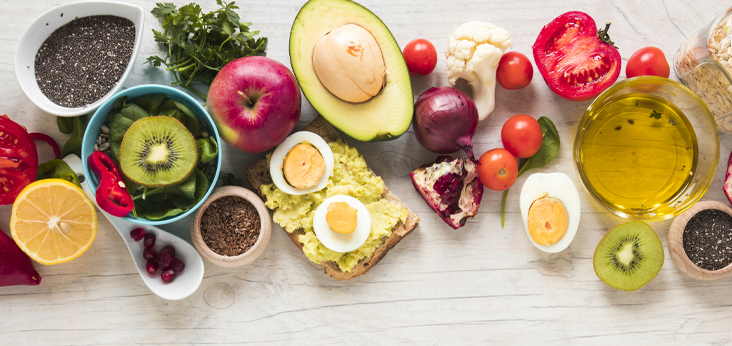As we get older, our bodies change in a variety of ways. The youthful plumpness of our skin begins to diminish with the depletion of collagen over time, our heart rate slows and bone density reduces. These are just a few of the many changes you can expect to see as you age, but there are so many ways to help maintain our bodies as we age.
Nutritional needs for middle-aged adults and elderly people differ from those of younger people, as the body tends to slow down, as we get older. As a result, it is just as important to maintain a healthy and balanced diet in your later years, so that you can keep feeling fit, healthy and energized for as long as possible.
We have put together a few top tips for maintaining a healthy balanced diet as the years go on, so you can keep in good health and prolong vitality.

The importance of a balanced diet
Throughout our lives we often get told to eat a healthy and balanced diet – but what does this entail and why is it so important?
A ‘balanced’ diet is one that involves eating a wide variety of foods from different food groups and in the right proportions. These food groups are:
• Fruit and vegetables
• Starchy foods
• Milk and dairy foods
• Beans, pulses, fish, eggs, meats and other proteins
• Oils and spreads
This allows you to obtain all the nutrients you need to support normal bodily function, growth, and repair.
A healthy balanced diet for a child will differ from a balanced diet for teens, adults and the elderly in terms of food types and quantity. For example, young children are more active than adults are; therefore, they need foods that will provide them with lots of energy.
It is essential that both men and women carry these healthy eating habits through to their later years so that they can support their bodies in later life too.
Does the ageing process differ between men and women?
While the ageing process between men and women is similar, there are some key differences between the way men and women age.
According to research by the World Health Organisation (WHO), women are more likely to live longer than men are. Women also go through the menopause and tend to gain weight for around 10 years longer than men do. This means that women have to take care of their bodies in a different way to men, as they get older. Multivitamins for women, along with proper diet and low-impact exercise can help to support the changes women can experience, as they get older.
On the other hand, men are more affected by pattern baldness than women are, and they have thicker skin, which ages more gradually than women’s do.
Which diet supports the nutritional needs of elderly people?
It’s important to continue to consume foods from a wide range of food groups as we get older, but there are certain nutrients that you need more of in old age.
For example, the ability to synthesize vitamin D worsens with age. As a result, it’s recommended that older people add a vitamin D supplement to their diets, as well as regularly consuming foods that are rich in vitamin D, such as salmon and egg yolks.
To help support your body’s needs as it gets older, we have compiled a list of top tips to help you maintain a healthy diet.
1. Reduce salt intake Eating too much salt is linked to high blood pressure, which can lead to serious cardiovascular conditions such as heart disease or stroke. These conditions are the main cause of mortality and morbidity in those aged 65 and over, so reducing your salt intake can help you to live a longer life.Top tip: Read our guide on salt substitutes to give meals flavor to help cut back on your salt intake.
2. Eat more fibre Fibre can help to aid digestion while helping to lower blood sugar and cholesterol levels. Fibre is important throughout all stages of life. However, it is especially important for older people as it helps to reduce the risk of developing heart problems. 3. Consider adding a multivitamin supplement for the over 50s to your diet Choosing a vitamin supplement designed to safeguard the special nutritional needs of people over 50 can help to bridge the gap between the level of nutrients you currently consume and the level of nutrients you need to support bodily function.Eating well as you, age does not have to be difficult. Simply be mindful of the foods that you are eating and you will be well on your way to a long and rewarding life.
Author: Rebecca in 2018-05-31Source:http://bit.do/e3Wvu
Photo(s) credit: freepik.com

